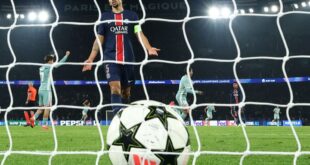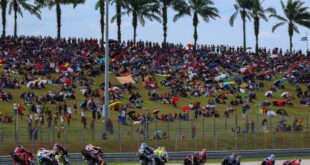BERLIN (Reuters) – Russians and Belarusians who qualify in their sport for the Paris 2024 Olympics can take part as neutrals without flags, emblems or anthems at the event next year, the International Olympic Committee (IOC) said on Friday.
Russians and Belarusians had initially been banned from competing internationally following Russia’s invasion of Ukraine last year, for which Belarus has been used as a staging ground.
In March, however, the IOC issued a first set of recommendations for international sports federations to allow Russian and Belarusian competitors to return and they have since done so in most events.
Athletics, the Games’ biggest sport, is unlikely to open the door for them to return to competition, however, after banning them following the invasion and sticking to the suspension on Friday.
“The Executive Board (EB) of the IOC has decided that Individual Neutral Athletes (AINs) who have qualified through the existing qualification systems of the International Federations (IFs) on the field of play will be declared eligible to compete at the Olympic Games Paris 2024,” the Olympic body said in a statement.
“Individual Neutral Athletes are athletes with a Russian or Belarusian passport.”
The neutral athletes will only compete in individual sports and no teams for the two countries will be allowed to participate in Paris.
The IOC, which in October suspended the Russian Olympic Committee for recognising regional organisations from four territories annexed from Ukraine, also said athletes who actively support the war in Ukraine would not be eligible.
It also said no Russian or Belarusian government or state official would be invited to or accredited for Paris 2024.
But athletes, it added, should not be punished for the actions of their governments.
Ukraine has opposed the presence of Russian competitors, even as neutrals, at the Paris Olympics.
Out of 4,600 athletes globally who have qualified for the Paris Games so far, eight are Russians and three hold Belarusian passports. More than 60 Ukrainians had qualified.
ATHLETICS MAINTAINS BAN
Athletics’ suspension of Russia for state-sponsored doping was lifted this year but, after the invasion of Ukraine, which Moscow called a “special military operation”, all Russians and Belarusians were banned from the sport.
In response to the IOC decision on Friday, World Athletics (WA) said: “Our position on Russian participation remains the same and has been very clear from the outset: All athletes, support personnel and officials from Russia and Belarus are excluded from all World Athletics Series events, and from hosting any International or European athletics events.”
“We will continue to monitor the situation, but unless there is a major change in circumstances between now and the Olympic Games, this exclusion will apply to Paris 2024.”
“It is the IOC’s remit to decide which countries are invited to participate at the Olympic Games, but it is the responsibility of the IFs (international federations) to decide which athletes within their sport are eligible to compete.”
At August’s World Championships in Budapest, WA president Sebastian Coe said it would have been “inconceivable” for Russians and Belarusians to have competed, saying that the ban was for “reasons of integrity – this wasn’t about passports or politics.
“The death and destruction we have seen in Ukraine over the past year, including the deaths of some 185 athletes, have only hardened my resolve on this matter. It is an intolerable situation and that’s why I won’t be changing my views anytime soon.”
Russia’s gymnastics coach, Valentina Rodionenko, played down the significance of the IOC’s decision.
“There is no need to talk about any breakthrough,” Rodionenko was quoted as saying by TASS news agency.
“The IOC, by allowing our athletes to take part in the Olympics, retained the same extremely humiliating conditions that were previously outlined in recommendations to international federations. I believe that we do not need to go to Paris under such conditions.”
“As for the gymnasts, we still need to try to qualify through the World Cup stages. I think that it will be very difficult to show a high result. I think the athletes will be forced to perform under great psychological pressure with questionable judging,” she said.
(Reporting by Karolos Grohmann; additional reporting by Mitch Phillips and Gabrielle Tetrault-Farber; Editing by Andrew Cawthorne and Toby Davis)
 BeritaKini.biz Berita Viral Terkini di Malaysia
BeritaKini.biz Berita Viral Terkini di Malaysia





